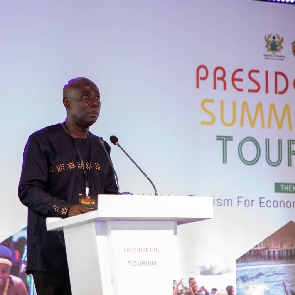 Vice President of the Ghana Tourism Federation, Dr. Kwesi Eyison
Vice President of the Ghana Tourism Federation, Dr. Kwesi Eyison
A two-day Presidential Summit on tourism took place at Peduase Lodge in the Eastern Region of Ghana.
The event which is under the theme "Rethink Tourism for Growth and Jobs Creation" was organized under the auspices of the Ministry of Tourism, Art and Culture and Ghana Tourism Authority.
It brought together industry captains drawn from the private sector, policymakers, academia entrepreneurs, international business community and traditional rulers to explore new approaches to the tourism industry with a priority focus on national development, job creation and sustainable tourism.
The occasion was graced by President Nana Addo Dankwa Akufo-Addo.
Vice President of the Ghana Tourism Federation (GHATOF), Dr. Kwesi Eyison in his open address touched on a fine balance between economic growth and environmental conservation.
He said "Our commitment to sustainability must be unwavering. A green economy should be at the heart of our tourism strategy and development. Green economy principles advocate for sustainable tourism practices that minimize negative environmental impacts whiles maximizing economic and social benefits."
He added that, "Green skills development programs can focus on training our youth, artisans, tourism and hospitality establishments, academia, local communities in areas such as eco-tourism guiding, carbon off-setting schemes, wildlife conservation, renewable energy technologies, sustainable agriculture, waste management, and sustainable hospitality practices."
In seeking to make Ghana a destination of choice within the global community, Dr.Eyison said "Let us not forget the power of digital connectivity in today's interconnected world. Reliable and affordable internet access is vital for promoting our tourism and hospitality offerings, attracting domestic, regional and international tourists and facilitating seamless travel or visitor experiences.’’
While Ghana abounds in rich natural mineral resources for socio-economic growth Dr. Eyison stated the need to prioritize the empowerment of the local communities.
He said "they are the true custodians of our cultural heritage, and their involvement is vital for tourism to become a force for inclusive growth’’.
He continued that "let us provide them with the necessary training, skills development, and entrepreneurial support to participate in the tourism industry. By fostering community-based tourism enterprises, we can ensure that the benefits of tourism reach every corner of our country, creating employment opportunities, improving livelihoods, and reducing socio-economic disparities."
Dr. Eyison admonished that "we cannot embark on this transformative journey alone. Collaboration and Partnerships are critical. We must therefore continuously forge strong alliances with the private sector, consolidate engagement with international organizations and development agencies, and seek the expertise of tourism and hospitality professionals. For Public-Private Partnerships can drive investment, knowledge exchange, and skill development initiatives that will shape the future of our tourism industry’’